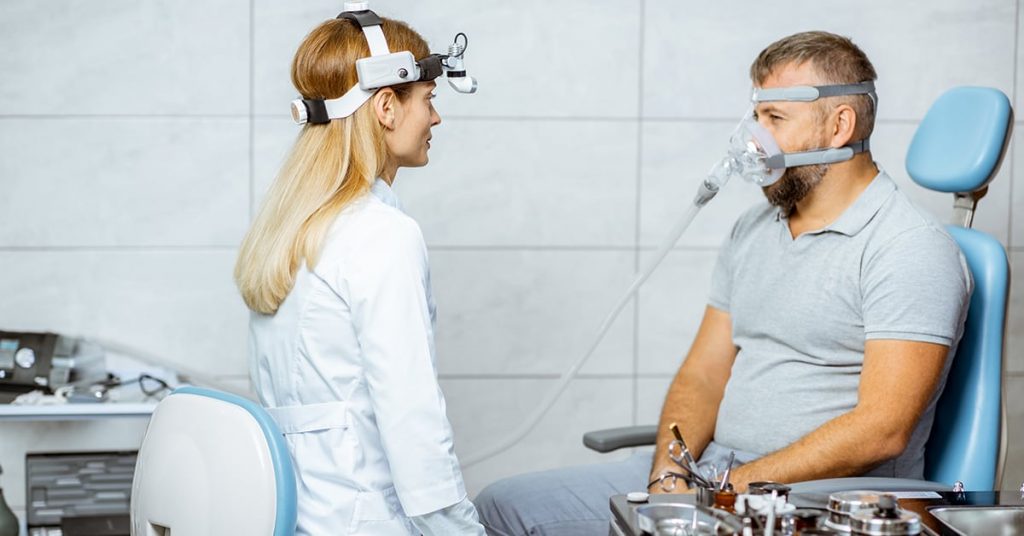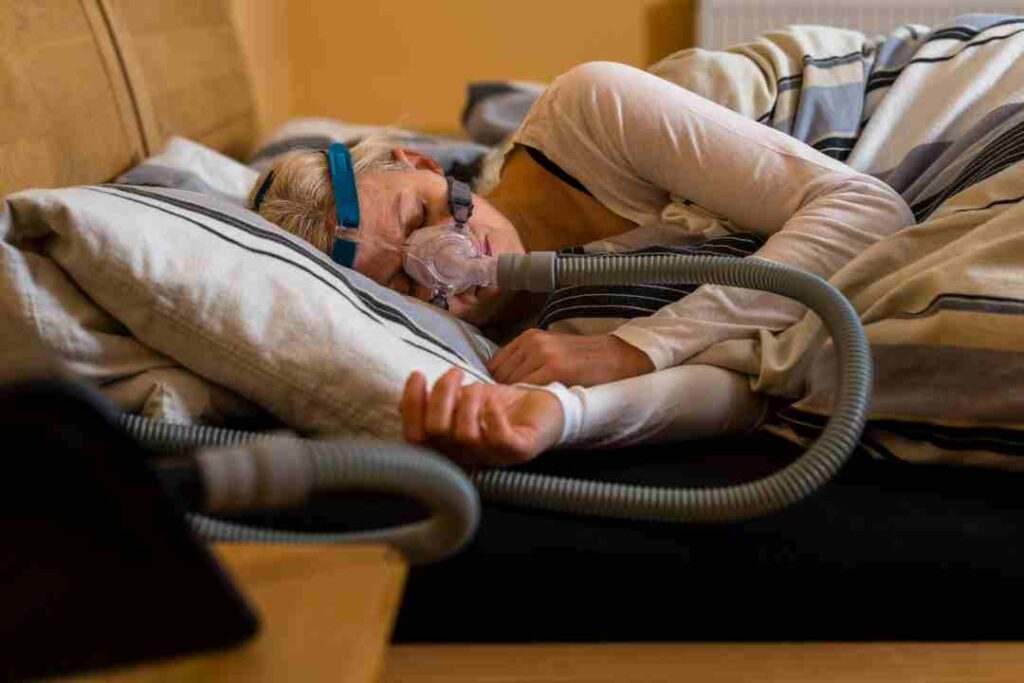Sleep apnea is a common sleep disorder that affects millions of people around the world. It can have a significant impact on both day-to-day life and productivity. Understanding sleep apnea and its consequences is essential for those who suffer from it as well as for those around them. In this article, we will explore the causes and risk factors of sleep apnea, its connection to productivity, its effects on quality of life, and strategies for managing it to improve productivity.
Understanding Sleep Apnea
Sleep apnea is a condition characterized by interruptions in breathing during sleep which need to use sleep apnea machine for cure. These interruptions, known as apneas, can last for a few seconds to a minute, and occur repeatedly throughout the night.
There are two main types of sleep apnea: obstructive sleep apnea (OSA) and central sleep apnea (CSA). OSA is more common and occurs when the airway becomes blocked or collapses during sleep. This blockage can be caused by various factors such as excess weight, enlarged tonsils, or a narrow airway. When the airway is blocked, the muscles in the throat struggle to keep it open, resulting in snoring and disrupted breathing patterns. On the other hand, CSA is caused by the brain’s failure to send proper signals to the muscles that control breathing. This can be due to neurological conditions or problems with the respiratory control center in the brain.
Defining Sleep Apnea
Sleep apnea is diagnosed when a person experiences at least five apneas per hour of sleep. These apneas can lead to a decrease in the amount of restful sleep a person gets, resulting in daytime sleepiness and fatigue. The lack of quality sleep can also lead to other health issues such as difficulty concentrating, memory problems, and mood disturbances.
It is important to note that not everyone who snores has sleep apnea. While snoring is a common symptom of sleep apnea, it does not necessarily indicate the presence of the condition. However, if snoring is accompanied by other symptoms such as gasping for air during sleep, morning headaches, or waking up with a dry mouth, it is advisable to consult a healthcare professional for further evaluation.
Causes and Risk Factors of Sleep Apnea
Several factors contribute to the development of sleep apnea. Obesity, for example, can increase the risk of developing sleep apnea due to the excess weight putting pressure on the airway. The accumulation of fat around the neck and throat can narrow the airway, making it more susceptible to collapse during sleep. Additionally, excess weight can lead to hormonal imbalances and inflammation, further contributing to the development of sleep apnea machine.
Other risk factors for sleep apnea include a large neck circumference, smoking, alcohol use, and certain medical conditions such as hypertension and diabetes. A larger neck circumference indicates a higher likelihood of airway obstruction during sleep. Smoking and alcohol use can relax the muscles in the throat, making them more prone to collapse. Medical conditions such as hypertension and diabetes are often associated with sleep apnea due to their impact on the cardiovascular and respiratory systems.
It is worth mentioning that sleep apnea can affect individuals of all ages, including children. In children, sleep apnea is often caused by enlarged tonsils or adenoids, which obstruct the airway during sleep. If left untreated, sleep apnea in children can lead to developmental and behavioral issues, as well as poor academic performance.
Overall, understanding sleep apnea and its causes is crucial for early detection and appropriate management. If you suspect that you or someone you know may have sleep apnea, it is important to seek medical advice to undergo proper evaluation and receive the necessary treatment to improve sleep quality and overall well-being.
The Connection Between Sleep Apnea and Productivity
Sleep apnea can have a significant impact on productivity, both at work and in daily life. Understanding the link between sleep apnea and productivity is crucial for individuals and employers alike.
Sleep apnea is a sleep disorder characterized by pauses in breathing or shallow breaths during sleep. These pauses can last for a few seconds to minutes and can occur multiple times throughout the night. The interruptions in breathing can lead to fragmented and poor-quality sleep, resulting in various negative effects on cognitive function and work performance.
Sleep Apnea and Cognitive Function
Poor sleep quality caused by sleep apnea can lead to cognitive impairments, such as difficulty concentrating, forgetfulness, and decreased alertness. These impairments can significantly affect a person’s ability to perform tasks that require focus and attention, ultimately reducing productivity.
When individuals with sleep apnea experience fragmented sleep, their brains are unable to go through the necessary sleep cycles, including the crucial deep sleep stage. Deep sleep is essential for memory consolidation and cognitive function. Without sufficient deep sleep, individuals may struggle to retain information, have trouble staying focused, and experience slower reaction times.
Furthermore, sleep apnea can also contribute to mood disturbances, such as irritability and depression. These emotional changes can further hinder productivity by affecting motivation and interpersonal relationships in the workplace.
Impact on Work Performance
Studies have shown that individuals with untreated sleep apnea are more likely to experience decreased work performance, including lower productivity, increased errors, and more frequent absenteeism. The excessive daytime sleepiness caused by sleep apnea can make it challenging to stay alert and engaged during working hours.
Excessive daytime sleepiness can lead to microsleep episodes, where individuals briefly fall asleep without realizing it. These microsleeps can occur during meetings, while operating machinery, or even while driving, posing significant safety risks. The potential for accidents and errors increases, further impacting work performance and productivity. You can also read about how to prepare for laser eye surgery, lasik in seven steps by visiting https://learning2livelife.com/how-to-prepare-for-laser-eye-surgery-lasik-in-seven-steps/
Moreover, the effects of sleep apnea extend beyond the individual suffering from the disorder. Co-workers may also be affected by reduced productivity or errors caused by a sleep-deprived colleague. This can create a ripple effect on team dynamics and overall workplace efficiency.

Recognizing the connection between sleep apnea and productivity is crucial for employers. Implementing strategies to support employees with sleep apnea, such as flexible work schedules, education on sleep hygiene, and access to appropriate medical treatment, can help improve productivity and overall well-being in the workplace.
In conclusion, sleep apnea can have a profound impact on productivity due to its negative effects on cognitive function and work performance. Understanding the link between sleep apnea and productivity is essential for individuals to seek appropriate treatment and for employers to implement supportive measures. By addressing sleep apnea, individuals can improve their overall quality of life and contribute to a more productive and efficient work environment.
Sleep Apnea and Quality of Life
While sleep apnea primarily affects sleep quality, it can also have various consequences on physical and mental health, ultimately impacting an individual’s overall quality of life.
Let’s delve deeper into the physical health consequences of sleep apnea. One of the most significant associations is with hypertension, or high blood pressure. Sleep apnea disrupts the normal breathing pattern during sleep, leading to intermittent drops in oxygen levels and increased blood pressure. Over time, this can put a strain on the cardiovascular system, increasing the risk of heart disease and stroke.
In addition to hypertension, sleep apnea is also linked to diabetes. The disrupted sleep patterns and oxygen deprivation caused by sleep apnea can impair glucose metabolism, leading to insulin resistance and an increased risk of developing type 2 diabetes. Managing diabetes becomes even more challenging for individuals with sleep apnea.
Furthermore, obesity and sleep apnea often go hand in hand. Excess weight can contribute to the development of sleep apnea, as the extra tissue in the throat can obstruct the airway during sleep. Conversely, sleep apnea can also make it difficult to lose weight, as the disrupted sleep patterns can affect metabolism and increase cravings for unhealthy foods.
Now, let’s explore the emotional and psychological effects of living with sleep apnea. Chronic sleep deprivation, which is a common consequence of sleep apnea, can have a profound impact on an individual’s mood and mental well-being. The constant fatigue, irritability, and difficulty concentrating can contribute to the development of mood disorders, such as depression and anxiety.
Moreover, the negative impact on personal relationships cannot be overlooked. The loud snoring and frequent awakenings caused by sleep apnea can disrupt the sleep of bed partners, leading to strained relationships and potential resentment. This can further exacerbate feelings of isolation and affect emotional well-being.
In conclusion, sleep apnea not only affects sleep quality but also has significant physical and psychological consequences. From an increased risk of hypertension, heart disease, and diabetes to the development of mood disorders and strained relationships, sleep apnea can significantly impact an individual’s overall quality of life. It is crucial to seek proper diagnosis and treatment to mitigate these effects and improve well-being.

Managing Sleep Apnea for Improved Productivity
Fortunately, there are several treatment options and lifestyle changes that can help individuals manage sleep apnea effectively, leading to improved productivity and overall well-being.
Treatment Options for Sleep Apnea
Treatment options for sleep apnea include Continuous Positive Airway Pressure (CPAP), oral appliances, and surgery. CPAP is the most commonly prescribed treatment and works by delivering a steady stream of air through a mask, keeping the airway open during sleep. Oral appliances and surgery are alternative options for those who cannot tolerate CPAP or have specific anatomical issues causing obstruction.
Lifestyle Changes to Mitigate Sleep Apnea
In addition to medical interventions, lifestyle changes can play a significant role in managing sleep apnea. These include maintaining a healthy weight, avoiding alcohol and sedatives before bedtime, sleeping in a position that promotes optimal airway alignment, and establishing a regular sleep schedule.
The Future of Sleep Apnea Research
Advancements in sleep science and technology offer hope for continued improvements in the diagnosis and treatment of sleep apnea, further enhancing productivity and quality of life.
Emerging Treatments and Technologies
Researchers are constantly exploring new treatment options and technologies to address sleep apnea. This includes the development of innovative devices, such as hypoglossal nerve stimulation, which can help keep the airway open during sleep.
The Role of Sleep Science in Public Health
The recognition of sleep apnea as a significant public health concern has led to increased focus and investment in sleep science. As our understanding of sleep apnea and its impact on productivity continues to grow, it is likely that new strategies and interventions will be developed to optimize sleep health and productivity on a broader scale.
In conclusion, sleep apnea can have a profound impact on day-to-day life and productivity. Understanding the causes, consequences, and management strategies for sleep apnea is vital for individuals who suffer from this sleep disorder. By seeking appropriate treatment, implementing lifestyle changes, and staying informed about emerging research in sleep science, individuals can improve their productivity and overall well-being while managing sleep apnea effectively.

